NOSOTROS TERMINABAMOS EL COLEGIO, INGRESABAMOS A LA FACULTAD DE MEDICINA Y AVANZABAMOS LOS ESTUDIOS... Y NUESTRO "VOLEI" FEMENINO NOS LLENABA DE ORGULLO UNA Y OTRA VEZ.... SE ACUERDAN ??
El sexteto que se coronó subcampeón mundial en su propia casa: Cecilia del Risco (6), Cecilia Tait (7), Raquel Chumpitaz (4), Gina Torrealva (11), Aurora Heredia (10) y Denisse Fajardo (9). Fue una hazaña de esas que nadie se esperaba... [Archivos de El Comercio]
MANOS PERUANAS SEGURAS SE ELEVAN Y PUNTO!!!
MANOS MORENAS GLORIOSAS QUE MERECEN PUNTO!!!
MANOS QUE SON EL ORGULLO DE NUESTROS COLORES...
VAMOS PERU QUE TU PUEDES SER CAMPEON DEL MUNDO..
VOLEY PERUANO VOLEY PERUANO... DOCE VECES CAMPEON SUDAMERICANO
Akira Kato---El demandante entrenador japonés, cuya visión del potencial de la mujer peruana comenzó a propulsar a las voleibolistas a nivel internacional. Sus entrenamientos rigurosos al estilo asiático sirvieron para crear una base sólida de fundamentos, y por supuesto, para hacer que las atletas alcanzaran un óptimo estado físico. Akira llegó al Perú por invitación de la Federación Peruana de Vóleibol (FPV) a mediados del ‘65, y estuvo al mando de la selección hasta el fin de los ‘70s. En marzo de 1982, a escasos meses del Mundial de Mayores en el Perú, Akira Kato murió en la ciudad de Lima. El se había encariñado con el Perú y el país ciertamente lo recordará siempre como “el padre del vóleibol peruano”.
Man Bok Park--- El Perú entero sintió el fin de una era cuando murió Akira Kato en 1982. Pero afortunadamente, una nueva etapa ya había comenzado con la asignación del surcoreano Man Bok Park como entrenador de la selección peruana. “Mambo”—como se le llegó a conocer en el Perú—completó el camino hacia la grandeza internacional, comenzando por el ámbito continental donde el Perú dominó por casi toda la década de los ‘80s.
Women's Volley Ball Is Big League in Peru
Sport Ranks Second to Soccer in Popularity
By Michael L. Smith
The Washington Post, September 12, 1986
Peru's national pride is riding on a dozen women competing in the world women's volleyball championship being played this week in Czechoslovakia.
Peruvian women's volleyball has won a following surpassed only by soccer -- no small accomplishment in a country where macho attitudes would make most men shrank away from watching a sport in which women compete.
But watch they do. More than 2 million Peruvians are expected to watch their team in the world championship finals -- in which on Friday they will meet world and Olympic champion China. The game will be broadcast live nationwide on two TV networks and, because of the time difference, most residents will forgo their lunch breaks to watch in front of Lima shop windows or in restaurants. For the match that cinched their advance to the four-teak finals, many Peruvians got up at 6 in the morning.
Peru has fielded solid women's teams for nearly two decades, consistently ending up among the top 19 teams in the world. In the 1982 world championship, with home court advantage, Peru was runner-up.
"Potentially good players grow like weeds," says Jesus Paniagua, a volley ball club sponsor and former member of the national volleyball federation. "The girls play because it is almost instinctive."
The sport is especially popular in Lima's shantytowns and working class neighborhoods. Twenty-two leagues, with four divisions each and more than 5,000 registered players, functioning in Lima, where volleyball is played on sand lots and concrete courts. However, most clubs are nothing more than 40 players with jerseys and a ball.
Although amateur, league play is highly competitive. The top players recruited for the major Lima league are usually guaranteed a good education, jobs with a corporate sponsor, special office hours, extended leaves and other privileges.
These rewards may seem modest compared to a professional soccer contract, but for a your woman coming out of a slum, it is a real triumph.
The aspiration is to reach the national team, which frequently travels abroad to championships and invitational tournaments. In the past, team members have been awarded apartments and cars for their strong showings and have received every honor the government has to offer.
Cecilia Tait, 24, from a fatherless family, was discovered 12 years ago playing on a sandlot in a shantytown. She was practically adopted by a major club. At 14, like most players now starring on the national team, she was placed in a special team of 30 promising girls, gleaned from the clubs and schools. Two years later, she made her debut on the youngest of three all-star teams representing the country.
Today the left-handed Tait is judged one of the strongest spikers in the world. "She's the Maradona of women's volleyball," says Paniagua of Tait, who is expected to sign with an Italian club after the championship.
Recent success has broadened the sport's appeal to other social classes. For instance, Gaby Perez del Solar, 18, comes from a well-to-do family. Until 1983, her sport was basketball. Then, "I saw how the volleyball girls traveled and I told my father, 'That's how I'd like to live, play and travel,'" she told a magazine here.
Soon afterward, she switched sports and within three months she joined the national team. At 6 feet 3, she has added a new dimension to the team, whose average height (5-8) is the smallest among the 16 teams at the world championships.
On the national team, players have to undergo rigorous seven-hour daily training sessions and even give up dating. The coach, Man Bok Park of South Korea, stresses temperance and discipline.
But what sets the women's volleyball team apart in the hearts of Peruvian fans is that even when they go up against powerhouses, they fight tenaciously for each point and ever give up.
For a small, troubled country like Peru with 20 million inhabitants, it is no mean compensation to be able to spike a ball against the major powers.
© 1986 Washington Post. All rights reserved
When talking of the top women’s volleyball teams in the 1970s, ‘80s and ‘90s, one thinks of Cuba, Japan, China, USSR (now Russia), Brazil and USA. Peru is hardly ever mentioned. Very few people are aware that this small South American country, which now has a population of 25 million, was consistently one of the top four or five teams in the world from 1979 through1993. Peru was sixth in the 1980 Moscow Olympics, second in the World’s Junior Championships in 1981, second in the 1982 World Championships in Peru, fourth in the 1984 Olympics in Los Angeles, third in the 1986 World Championships in Czechoslovakia and second at the 1988 Seoul Olympics.
What made this team remarkable was that, even with 6-3 superstar middle blocker Gaby Perez del Solar, its average height was around 5-8. The two feisty outside hitters were both 5-7 – Dennise Fajardo and Natalia Malaga. Both of them jumped well, but as Peru’s setter, Rosa Garcia, was about 5-8 and blocked middle opposite Gaby. Cecilia Tait, a 5-11 lefty, played right side opposite 5-10 Gina Torrealva. Another superstar of the early 80’s was Aurora Heredia.
Younger players that were substitutes and sometime starters in the late ‘80s were Sonia Heredia (the younger sister of Aurora), Jessica Tejada, and Mirian Gallardo.
The two famous coaches of the Peru women’s team were Japan’s Akiro Kato, who was first invited to Peru in 1965. He planned both their natonal progam and feeder system, while coaching and training the national team in the ‘70s. Kato died in March of 1982. He was succeeded by Korean Man Bok Park (“Mambo”), who coached them for 10 years and took them to the elite ranks of international women’s volleyball.
In the ‘80s and ‘90s, the outstanding Peruvian teams combined the ball control of the Asian teams, the hard hitting of the top Western teams, a feistiness that was a result of their Latin temperament and, most important, exemplary team play – they were unselfish and very well coordinated as a unit.
The team was a “national treasure.”
escrito por-- Dr. Taras (Terry) Liskevych
http://www.richkern.com/vb/Articles/Liskevych/02Peru.asp
Históricas de Seúl piden renuncia de Carlos Aparicio y dirigentes
martes, 5 de diciembre , 2006
(RPP-NOTICIAS)
Estaban todas ahí convocadas al unísono tras unas expresiones de Carlos Aparicio, según las cuales Mambo maltrataba a sus discípulas y toleraba inconductas. En forma tajante, y con el pleno respaldo de las medallistas peruanas de voleibol, las congresistas Cenaida Uribe y Gabriela Pérez del Solar solicitaron la renuncia inmediata de Carlos Aparicio, técnico del seleccionado nacional de voleibol. Fueron unánimes al momento de rechazar rotundamente sus declaraciones en las que afirmaba que Man Bok Park maltrataba físicamente y bebía alcohol con las jugadoras.
La reunión se realizó en la sala Mohme del Palacio Legislativo durante una inusual conferencia de prensa que reunió a ocho integrantes del equipo peruano que ganó la presea de plata en los Juegos de Seúl 88 bajo la conducción del coreano Man Bok Park. Acompañaron a Uribe y Pérez del Solar, Cecilia Tait, Gina Torrealva, Rosa García, Natalia Málaga, Denisse Fajardo y Katherine Horny, protagonistas todas ellas de la hazaña deportiva más grande en la historia del país.
Gabriela Pérez del Solar fue tajante. “Si hoy somos lo que somos se lo debemos a él, quien no solo fue nuestro entrenador y maestro, sino hasta tuvo que hacer de psicólogo. Nosotras entrenábamos 7 horas al día y por eso ganamos las medallas olímpicas y mundiales. La gestión de Aparicio es deficiente y no es positiva para la actual selección de voleibol, debe ser cambiado”.
Cenaida Uribe también se acercó a la net. “Tanto los dirigentes como Aparicio deben dar un paso al costado, la imagen de la selección ha sido pisoteada y eso no lo vamos a permitir. Necesitamos cambios en el deporte y en el voleibol, cualquiera de nosotras (y señaló a las ocho ex jugadoras) podría ser presidenta de la FPV. Junto con mi colega Pérez del Solar ya hemos conversado con Arturo Woodman, jefe del IPD, para que gestione la contratación de un técnico extranjero para el voleibol, ahora sí se tienen los recursos necesarios para hacerlo”.
Y Natalia Málaga fue más contundente: “Aparicio nos pone a todas en una situación muy incómoda. Es lamentable lo que ha dicho y una persona que se comporta así no puede estar a cargo de un seleccionado patrio. Él ha llegado a la selección demasiado fácil, sin ningún mérito y como ha fracasado como entrenador de las mayores ahora está dando manotazos de ahogado. Además es un ingrato porque Park lo trataba como a un hijo, él era su alumno y así le paga ahora”.
jueves, noviembre 09, 2006
Suscribirse a:
Comentarios de la entrada (Atom)

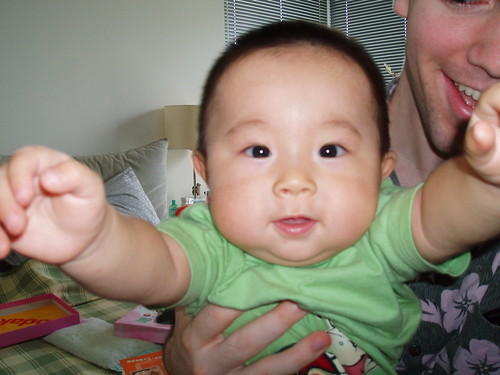








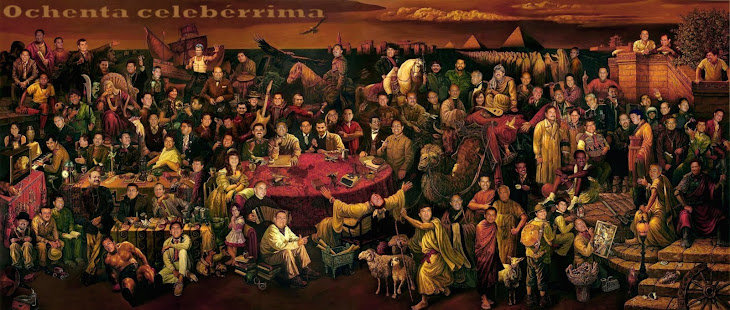
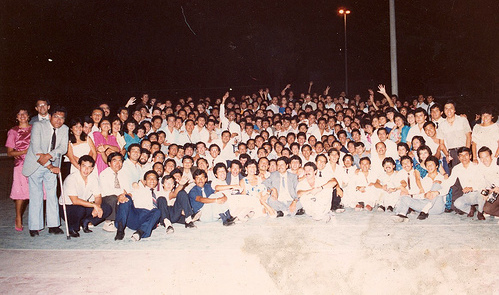
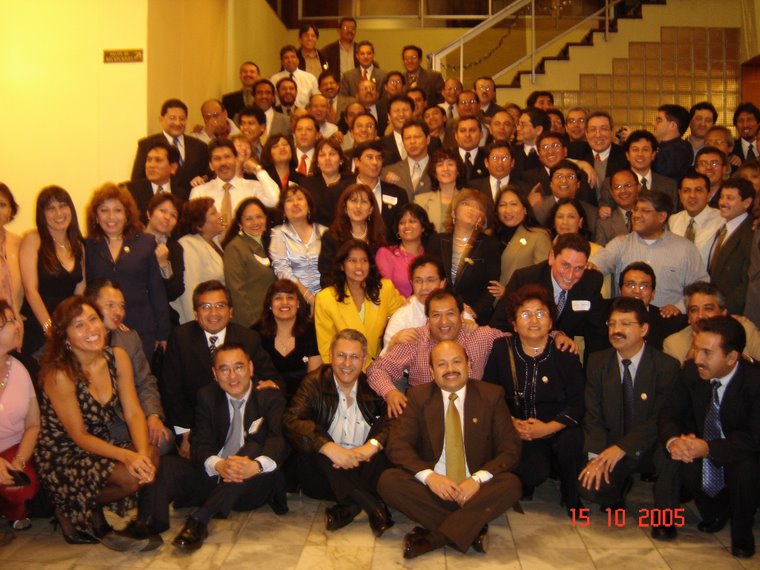
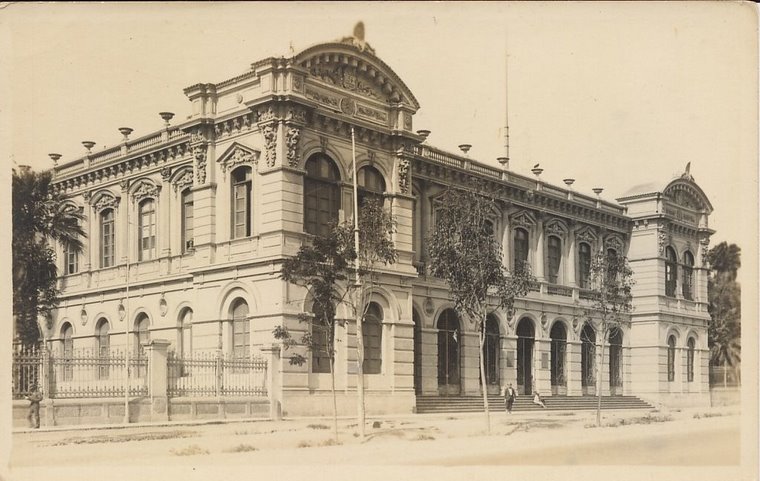
No hay comentarios.:
Publicar un comentario